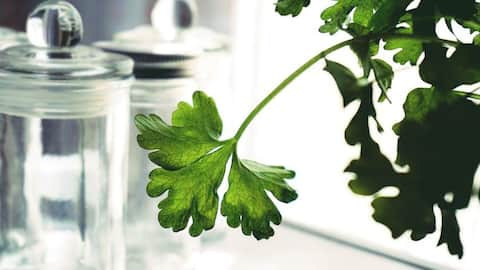Herbs that you can easily grow in your home
What's the story
As people desire fresh, flavorful ingredients at home, the appeal of kitchen herb gardens has soared, offering the joy and convenience of cultivating herbs indoors. Not only does a kitchen herb garden provide easy access to a variety of aromatic plants, but it also adds a touch of greenery and freshness to any indoor space. Let's help you create a kitchen garden.
Sunlit spot
Preparation
Growing herbs is simple; all you need is a sunny garden spot. Use a container large enough for all herbs with drainage holes, ideally 8-10 inches deep for proper drainage. Use repurposed items like milk cartons or bottles. Sunlit windows work well for herb growth. Prepare the potting mix with 50% regular garden soil and 50% organic compost, like tea leaves or vegetable peels.
Herb 1
Coriander
Soak coriander seeds overnight in lukewarm water for optimal germination. Choose a container or a sunny garden spot for planting, sprinkle the seeds, cover with soil, and water gently. Position the pot in a sunny area. Ensure that the soil remains consistently moist. Within 35-40 days, you'll notice coriander shoots ready for use in chutneys, garnishes, and more.
Herb 2
Thyme
Thyme, part of the mint family, boasts a versatile flavor ideal for enhancing cuisines worldwide. Thriving in well-drained soil, ensure your pot is situated in a warm, sunny location. Allow a few months for the plant to be fully established. Regularly water the plant to prevent wilting. Harvest the lemony leaves with a knife, incorporating them into soups or stir-fried veggies.
Herb 3
Chives
Chives, belonging to the onion plant family, feature edible flowers. They thrive in cooler seasons, making September to December ideal for growing in India. Despite being drought-tolerant, it's crucial to water chive plants adequately. Once the flowers bloom, promptly harvest them to prevent seed scattering. Expect a harvest around six months after planting seeds. Utilize it to enhance dishes like pizzas and salads.
Herb 4
Parsley
This mildly bitter herb elevates the flavor of dishes and remains evergreen throughout winter. Parsley, abundant in vitamins A and C, boasts various medicinal properties. Enhance seed germination by soaking them overnight, then plant them closely together as they thrive in competition. Once true leaves emerge, space seedlings are 6 inches apart. Expect parsley to germinate within three to four weeks.
Herb 5
Basil
Basil flourishes in warm temperatures and is sensitive to cold weather. Select a sunny spot with at least six hours of sunlight and plant seeds in well-drained soil. Consider planting basil seeds alongside other vegetables with similar light and water requirements, like tomatoes. To use, simply trim off the leaves and incorporate them to make herbal tea.
